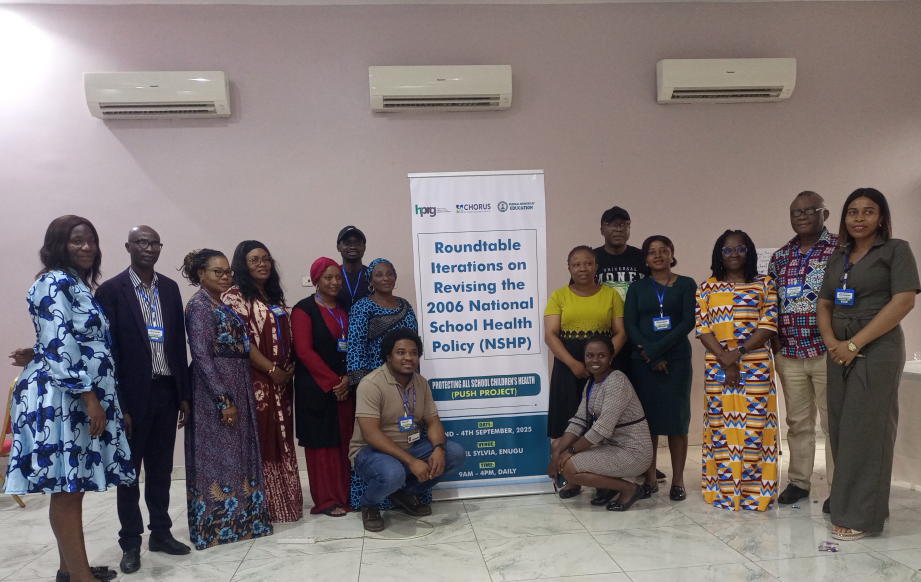Stakeholders demand review of 2006 National School Health Policy

By Chinedu Adonu
Stakeholders in the health and education sectors have called for a comprehensive review of the 2006 National School Health Policy (NSHP) to address the growing health challenges faced by Nigerian schoolchildren.
The call was made during a roundtable on revising the NSHP, organised by the Protect Urban School Children’s Health (PUSH) project, led by the Health Policy Research Group (HPRG) of the University of Nigeria. The event, held at Sylvia Hotel, Enugu, brought together representatives of government agencies, international organisations, and professional associations.
The PUSH project is supported by the Rivers State Ministry of Health, the University of Dundee (Scotland), and the CHORUS Urban Health Research Consortium.
Participants included representatives of the Federal Ministries of Education, Health and Social Welfare, Women Affairs, and Budget and Economic Planning, alongside officials from the World Health Organisation (WHO), Nigeria Centre for Disease Control (NCDC), United Nations Educational, Scientific and Cultural Organisation (UNESCO), National Primary Health Care Development Agency (NPHCDA), Enugu State Primary Health Care Development Agency, and the Paediatrics Association of Nigeria (PAN).
Principal Investigator of the PUSH project, Dr. Prince Agwu, said the review and full implementation of the NSHP had become urgent to accommodate emerging health concerns among schoolchildren.
He noted that related policies such as the Child Rights Act and the National Policy on the Health and Development of Young People had not been effective.
“School-based health services are not optimal, essential health indicators are being neglected, and the links between schools and the health system—particularly primary healthcare—have broken down. The consequences reflect a lack of collective and committed attention to the health of schoolchildren, as evidenced by an outdated school health policy,” Agwu said.
He identified gaps in governance, financing, operational plans, and implementation within the 2006 policy, adding that a new chapter had been developed for inclusion in the revised document.
According to him, the research team applied qualitative, quantitative, and geographic information system methods to assess health challenges facing schoolchildren.
“It became clear that we need to rework the National School Health Policy to meet current realities. We also held policy dialogues involving children to ensure their voices were integrated into the evidence we produced. We are hopeful that the Federal Ministry of Education will continue working with us to push this policy to the next phase of validation and implementation,” he said.
Assistant Director of Programmes at the Federal Ministry of Education, Mr. Ogwuche Itodo, described the revision as long overdue and pledged the ministry’s commitment.
“By the grace of God, we’ll present our report to the Permanent Secretary for onward transmission to the National Council on Education, which takes decisions on education issues. Once that is done, all states and local governments will have a framework for implementation,” Itodo assured.
Similarly, Senior Medical Officer at the NPHCDA, Dr. Peter Wuya, said the old policy had become obsolete and stressed that the revised version would address modern concerns such as stress disorders, learning disabilities, social media addiction, substance abuse, and sexual health issues.
He added that ongoing revitalisation of primary healthcare centres, with improved infrastructure and staffing, would further strengthen implementation.
UNESCO Professional Officer in the Education Sector, Ms. Oyebukola Adeleye, pledged the organisation’s readiness to provide technical support for the revised policy.
President of the Paediatrics Association of Nigeria (PAN), Prof. Ekanem Ekure, represented by Prof. Maduka Ughasoro, said the framework would help schools provide safer learning environments.
“The new policy will ensure schools are optimal in structure, ventilation, lighting, and meal provision. It will also strengthen links between schools and communities, while embedding health, physical education, and environmental issues into the curriculum,” he said.
The post Stakeholders demand review of 2006 National School Health Policy appeared first on Vanguard News.







